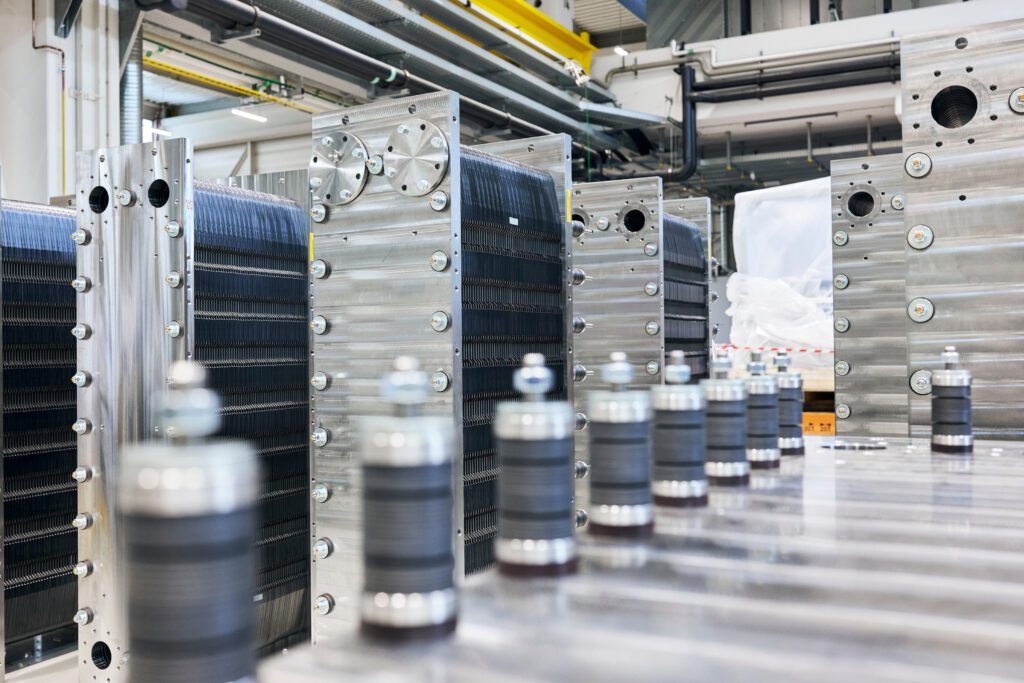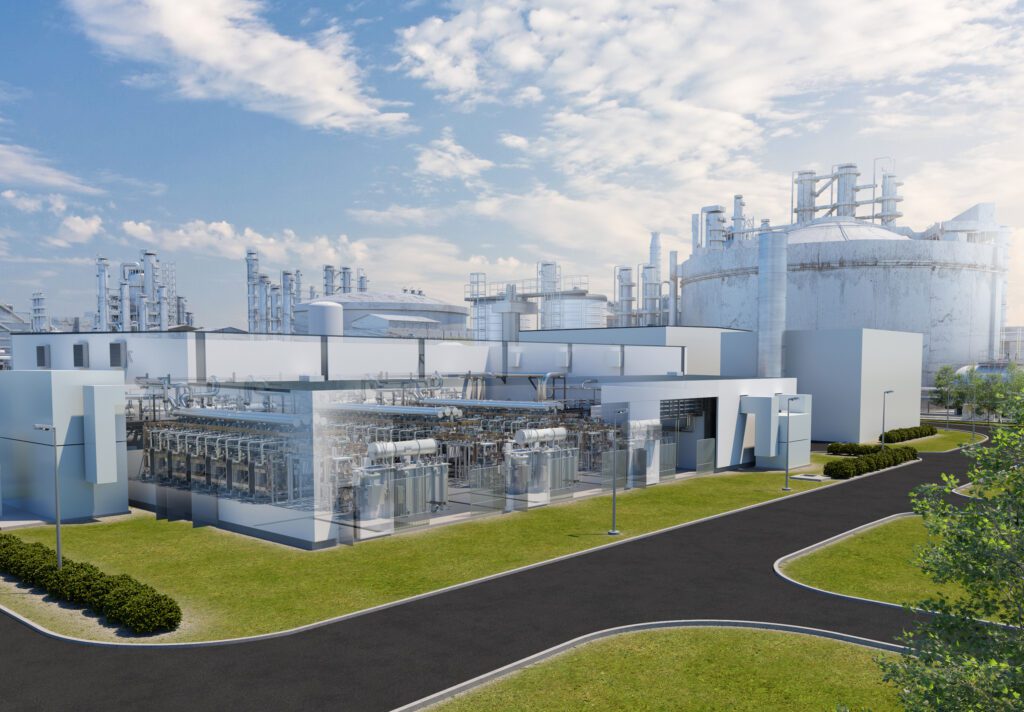With the approval of funding from the German Federal Ministry for Economic Affairs and Climate Action and the State of Rhineland-Palatinate, BASF SE (Ludwigshafen, Germany; www.basf.com) has come a major step closer in building a proton exchange membrane electrolyzer. In cooperation with Siemens Energy, work on the water electrolysis at the Ludwigshafen site — the so-called Hy4Chem-EI project — is now entering the next phase of construction. Franziska Brantner, Parliamentary State Secretary at the Federal Ministry for Economic Affairs and Climate Action, presented the official notification of funding to Melanie Maas-Brunner, member of the Board of Executive Directors of BASF SE and Site Director Ludwigshafen, in the presence of Malu Dreyer, Minister-President of Rhineland-Palatinate.
With an output of 54 MW and a capacity of up to 8,000 metric tons (m.t.) of hydrogen per year, the PEM electrolyzer will be one of the largest of its kind in Germany once it is operational. Powered using electricity from renewable energy sources, the system will produce CO2-free hydrogen and thereby reduce greenhouse gas emissions at the site by up to 72,000 m.t./yr. BASF will primarily use this hydrogen as a raw material in the manufacture of products with a reduced carbon footprint. In addition, the company will supply hydrogen for mobility in the Rhine-Neckar Metropolitan Region to support the ramp-up of a hydrogen economy in the area.
BASF and Siemens Energy plan to begin operating the water electrolysis plant in 2025. In cooperation with the State of Rhineland-Palatinate, the German Federal Ministry for Economic Affairs and Climate Protection is contributing up to €124.3 million to the project — up to €37.3 million of which will be financed by the government of Rhineland-Palatinate.

The core elements of hydrogen electrolysis are these so-called “stacks”. These are currently being manufactured in Siemens Energy’s new gigawatt factory in Berlin. BASF is one of the first customers to be supplied from the new gigawatt factory (Source: Siemens Energy)
Melanie Maas-Brunner, member of the Board of Executive Directors of BASF SE and Site Director Ludwigshafen, said: “In today’s chemical industry, our main need for low-carbon hydrogen is as a raw material. In the long term, it will also become increasingly important for BASF as an energy vector. That is why I am particularly pleased that our politicians have recognized the project’s potential. In Siemens Energy, we also have a partner with outstanding technological expertise at our side. The current funding commitment shows that politics and business are working together to shape the industrial sector’s energy transformation. This is both a milestone on the road to net zero carbon emissions and a sign of the Ludwigshafen site’s capabilities.”
Franziska Brantner, Parliamentary State Secretary at the Federal Ministry for Economic Affairs and Climate Action, commented: “I am delighted to present the funding notification today for this pioneering project aimed at decarbonizing the chemical industry. As the largest project of its kind to date at a chemical site, it is a leading example of how we can achieve our climate targets. In this way, German companies are demonstrating how the hydrogen economy can become a reality and that carbon neutrality and future viability go hand in hand.”
Malu Dreyer, Minister-President of Rhineland-Palatinate: “As the state government, we are promoting the expansion of the hydrogen economy. €184 million in regional funding has been earmarked for this purpose. Hydrogen is the energy carrier that will pave the way for our future as a center for business in a climate-neutral Rhineland-Palatinate. We are focusing on expanding both the infrastructure for hydrogen imports and local production. That is why the Hy4Chem project is a milestone in the ramp-up of the hydrogen economy in Rhineland-Palatinate, Germany, and Europe — and in the decarbonization of entire industries. BASF is a global pioneer in the chemical industry’s energy transformation and a role model in the use of innovative climate protection technologies, which are making an important contribution to the reduction of greenhouse gas emissions. My state government and I will continue to support this process extensively in line with our long-standing close and trusting cooperation. The State of Rhineland-Palatinate’s provision of over €37 million in funding for Hy4Chem underlines its importance to the entire state.”
Katrin Eder, Rhineland-Palatinate’s State Minister for Climate Protection, Environment, Energy, and Mobility: “Hydrogen technology will lead to a significant reduction in environmentally harmful greenhouse gases. Zero-emissions hydrogen also has many possible applications. As a raw material, as an energy carrier, and as an energy storage medium, climate-neutral hydrogen will make important contributions to the decarbonization of our economy and to ensuring a reliable supply of renewable energy. The development and market ramp-up of energy- efficient and cost-efficient hydrogen technologies are key steps toward establishing a sustainable hydrogen economy in Rhineland-Palatinate, across Germany, and throughout the EU. BASF’s Hy4Chem project will play an important role. Last but not least, this project will help us to support Rhineland-Palatinate as a center for business and our innovative strength in the long term.”
Hydrogen is the starting point for important chemical value chains. At the Ludwigshafen site, the company uses around 250,000 m.t./yr, which are produced by means of steam reforming or occur as coupling products and byproducts. Steam reforming, the current conventional production process, generates high CO2 emissions. Changing the technology for producing hydrogen and using this hydrogen as a raw material for chemical products should significantly reduce BASF’s carbon footprint. In order to drive the ramp-up of the hydrogen economy, BASF is committed to remaining as open as possible toward different technologies for the production of low-emission or emission-free hydrogen. Besides water electrolysis, such options also include methane pyrolysis.
BASF has set itself the target of achieving net zero CO2 emissions by 2050. The use of renewable energies, an increase in energy efficiency in production, and new technologies will support this objective. The Ludwigshafen site has a key role to play: Numerous technologies are being tested and developed at the company’s headquarters with the aim of replacing fossil fuels and using renewable electricity instead. In addition to water electrolysis, examples include the demonstration plant for electrically heated steam cracker furnaces and a methane pyrolysis test plant.

Illustration of the future water electrolysis plant integrated at the BASF site in Ludwigshafen (Source: Siemens Energy)